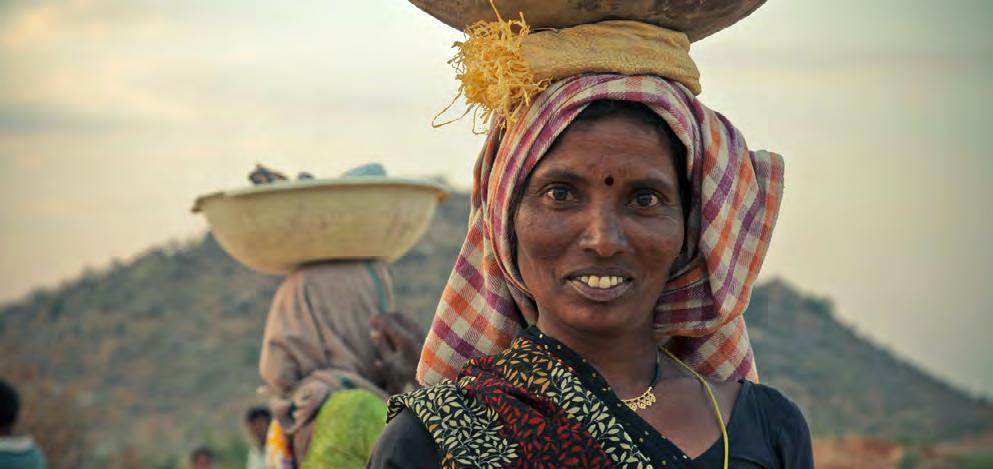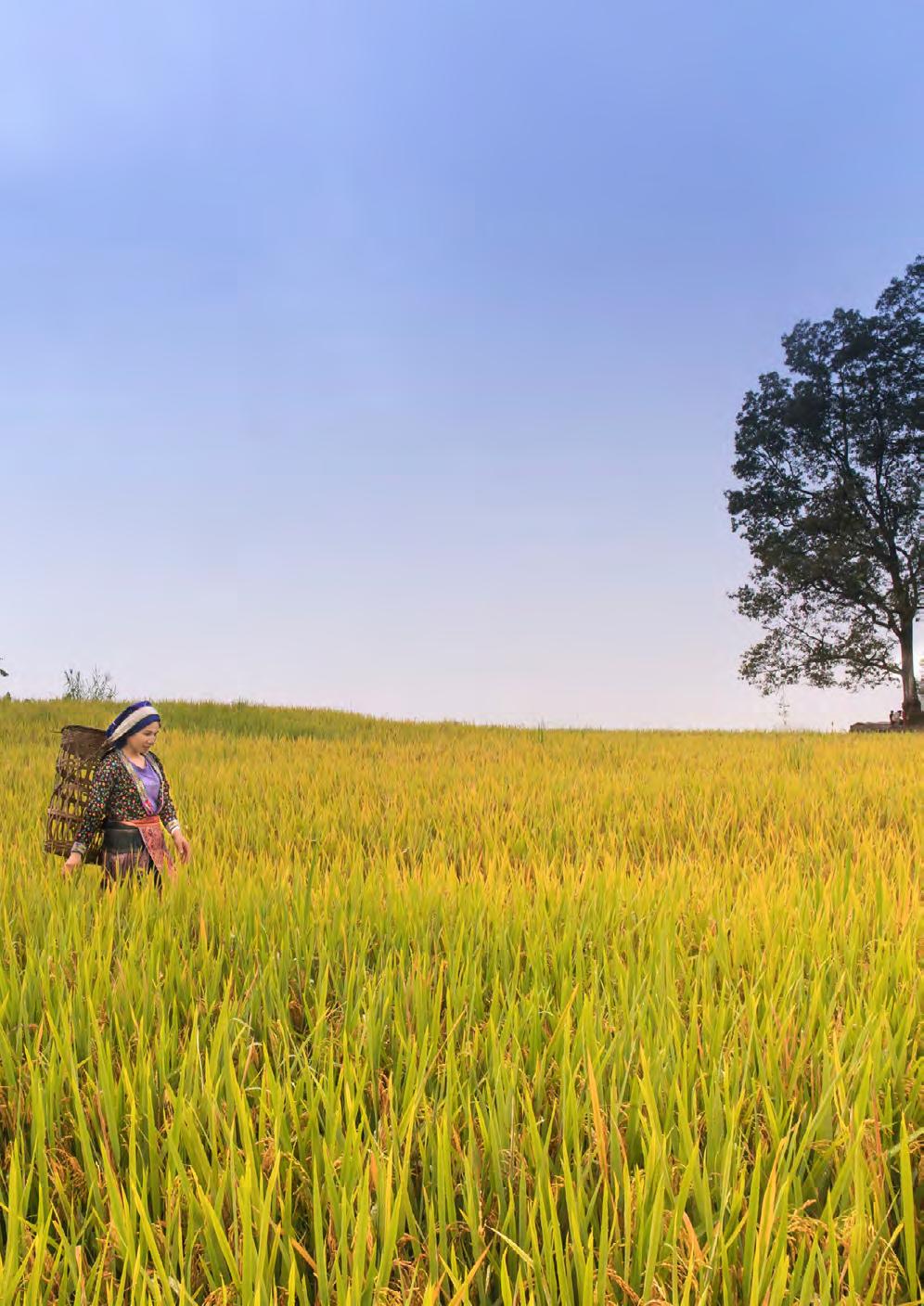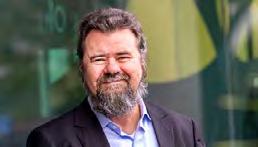








Over the last year, CDES has been very successful in extending its work on education and health to address the evolving issues due to COVID-19. Our researchers have also now been considerably engaged in research on climate change and gender. CDES will lead research work using field experiments to understand what works in addressing violence against women. The research will be a long-term collaboration with partner countries in Indo-Pacific regions – Indonesia, Fiji and Vietnam, as part of a new Australian Research Council (ARC) Centre of Excellence for the Elimination of Violence Against Women (CEVAW)
Last year was also our best year in attracting large external research funding to date. We are now working closely with different international agencies such as the World Bank and Asian Development Bank on various economic and social policy issues in many countries. These issues include poverty, inequality, climate change, education and health.
For the third year in a row, we were delighted to have a Nobel laureate as our distinguished guest for our annual public lecture. In November 2022, we were privileged to host Professor Michael Kremer. We also continued our successful webinar series focusing on policy issues related to COVID-19. We have also continued our weekly academic seminar series in collaboration with the department of economics.
We continue to grow the list of our resident and non-resident fellows. I invite you and your network to join us
We are organizing the Prato Conference after a gap of three years due to COVID-19. The conference is now scheduled to be 29-30 June 2023,
followed by summer school for PhD students in collaboration with Italian Development Economic Association. We hope you will submit your paper for the conference. The call is out now
As part of extending our teaching portfolio, we are starting a new course at the Masters level on Costbenefit analysis and economic decision making. This is on top of our current courses on Poverty, Inequality and Opportunity; Field Experiments for Social and Public Policy; and Macroeconomic Theory and Policy for Developing Countries.
I look forward to seeing you in person this year as we are now doing most of our activities in person beginning from this year.
Warm wishes for a wonderful year ahead,
Professor Asad Islam Director, Centre for Development Economics and Sustainability (CDES), Monash Business School
Our mission is to conduct and promote high-quality policy-relevant research on major global issues in development and sustainability, and enhance research capacity and knowledge in these areas.
Our mission is consistent with and aligned to the University’s and the Business School’s commitment to the United Nations Sustainable Development Goals (SDGs).

Founded as the Centre for Development Economics (CDE) in March 2012, the centre was renamed in 2015 to explicitly include economic research on issues related to sustainability.
Today the Centre for Development Economics and Sustainability (CDES) promotes cross-disciplinary research in the thematic areas of development and sustainability.
CDES brings together researchers from a variety of academic backgrounds in the Monash Business School engaged in global sustainable development issues encompassing the three dimensions of economic, social and environmental sustainability.

The centre strives for policy impact and external engagement within and beyond the world of academia.
Conducting and fostering high quality research in the thematic areas of development and sustainability both within the developing country context and beyond, including cross-disciplinary work.
Promoting national and international collaborative links with those involved in research, policy and practice of economic development and sustainability.
Striving for policy impact through the dissemination of research findings and the promotion of informed public discussion and dialogue.
Enhancing the profile of Monash Business School and Monash University in the areas of development and sustainability within Australia and internationally.
“The centre strives for policy impact and external engagement within and beyond the world of academia.”
The Centre presently has six core researchers and over 40 Monash Business School academics and post-graduate students as members, along with an increasing number of non-resident international fellows.

Asad Islam is the Director of CDES and a Professor at the Department of Economics at Monash University. He has extensive experience working in the field to implement academic and policy-relevant research including the economics of education and health, food security, energy, disaster and environment, technology adoption, gender, microfinance, social networks, and corruption. His research spans several developing countries including Bangladesh, India, Pakistan, China, Cambodia, Uganda, and Tanzania. Asad has been published extensively in leading economics and public policy journals, and has attracted many competitive international grants, such as from the Australian Research council (ARC), UK Research Council (ESRC), DFID, AusAID (DFAT), International Growth Centre (IGC), European Commission, and World Bank.
He is currently collaborating with leading NGOs and institutions in Bangladesh to address a number of emerging challenges on COVID-19 issues. He has given interviews in different media and written on broader public policy responses on COVID-19 in developing countries.

Sisira Jayasuriya is a Professor of Economics and former Director of CDES. His current research is on trade and macroeconomic issues in Asia, agriculture and food security, gender and development, and natural disasters. He has held previous appointments at the International Rice Research Institute, the Australian National University, Melbourne University and La Trobe University, He is Distinguished Fellow, Institute of Policy Studies, Sri Lanka, NonResident Senior Fellow, National Council of Applied Economic Research, New Delhi and Honorary Professor Institute of Social and Economic Studies, Osaka University.
Note: Sisira formally retired from academic life in the second half of 2022. We send him our best wishes as he enjoys his well-earned retirement!

Gaurav Datt is an associate professor at CDES. Gaurav joined Monash University in 2011 with over twenty years of research and operational work experience in the development sector, including research positions at the World Bank and the International Food Policy Research Institute (IFPRI). His research focuses on poverty, income distribution, education, labour and social policy issues, and his work encompasses several countries including India, China, Egypt, Laos, Mozambique, Myanmar, Nepal, Papua New Guinea, the Philippines, Sri Lanka and Timor-Leste. He has published widely in development and applied economics journals.


Wang-Sheng Lee is an Associate Professor at CDES. Wang joined Monash in 2021 and has previously held academic positions at Deakin, RMIT and the University of Melbourne. He has also previously worked as a social policy consultant at Abt Associates in the US where he was involved with welfare reform evaluations using large scale experiments. His research interests include applied micro-econometrics, development economics, environmental pollution, health and labour economics and the Chinese economy. He has published widely in leading journals including the Journal of Development Economics, Journal of Health Economics, Demography, Economics and Human Biology, Empirical Economics, Journal of Economic Behavior and Organization, Journal of Economic Psychology, Journal of Population Economics, and Oxford Economic Papers. He is the recipient of the 2012/2013 Lawrence R. Klein Award from Empirical Economics, a biannual prize awarded for the best paper published in the journal.

Emilia Tjernström joined CDES in 2022 as Senior Research Fellow. She has previously held academic positions at the University of Wisconsin, Madison and the University of Sydney. Her research draws on insights from behavioural economics and employs econometrics, field-, and lab-in-the-field experiments to examine a variety of topics within development economics. In recent interdisciplinary work, she collaborates with atmospheric scientists to improve access to and analysis of air quality data in sub-Saharan Africa. Towards this goal, she co-founded AfriqAir, a research network that has to date deployed over 50 low-cost sensors and reference-grade monitors in 11 African countries.
Her work has been cited by the Economist and she has raised over US$6 million in grant funding from a variety of sources, including the Bill and Melinda Gates Foundation, the National Science Foundation, and USAID. Her work has been published in the Journal of Development Economics, American Journal of Agricultural Economics, World Development, and Journal of Economic Behavior and Organization, among others. Her article “Money matters: the role of income and yields in agricultural technology adoption” received the 2020 Outstanding article award from the American Journal of Agricultural Economics.
Umair Khalil is a Senior Research Fellow at CDES. Umair joined the CDES in 2021 and has previously held academic positions at the University of Adelaide and West Virginia University in the United States before moving to Australia in 2017. His research interests lie in health economics, development economics and political economy as well as in developing new econometric methods for causal inference. Some past work has explored social interactions in voting behavior in India, effect of exposure to terrorist activity on child health in Pakistan, and role of marriage customs and institutions on female autonomy in the South Asian region. His research has been published in the Journal of Econometrics, Journal of Health Economics, Journal of Economic Behavior and Organization, among others.

Armand Sim is a Research Fellow at CDES. His research interests span issues in development economics, health economics, and public economics. He uses experimental and non-experimental methods in his works. He has evaluated the impacts of health insurance subsidy on health insurance enrollment and health care utilization in Ghana. In other work, he evaluates local government responses to local price shocks attributed to import rice restriction in Indonesia. In an ongoing work, he is involved in evaluating the impacts of providing various financial and non-financial interventions on COVID-19 vaccine promotion in Bangladesh, India, and Indonesia. His work has been published in World Development.
Shahab Sazegar was the Centre Coordinator for CDES in 2022 supporting the effective operation of CDES. In late 2022, he transitioned to a new role at Monash Business School as the impact labs coordinator.


Monisha Biswas is Centre Coordinator for CDES and joined CDES in early 2023. She helps CDES function effectively by offering a wide range of professional and administrative services. She has a PhD in information technology from Monash University. She has previously worked as a research manager in large international development organisations including Oxfam, ActionAid and UNDP. She wrote her PhD thesis on “The role of mobile technologies in the sustainability of women-led micro-enterprises and women’s empowerment in rural Bangladesh.”

“Our dynamic team of academic researchers share a passion for creating a tangible impact on society through their work.”
Our research explores economic and social issues in the developing world, and those concerning the environment and sustainability more broadly. Our expertise extends across several areas including growth, poverty and inequality, health and education, gender, environmental sustainability, agricultural development, political economy and governance, and big data. A sample of the projects our teams have been working on is provided below.

One in three children missed out on remote learning when COVID-19 forced schools to close

Learning losses resulting from COVID-19 school closures are among the most severe global challenges to medium- and long-term recovery from COVID-19. School closures caused millions of children across the globe to significantly miss out on the academic learning they would have acquired if they had been in the classroom, with younger and more marginalized children likely facing the most significant losses. The United Nation (UN) estimated that the Covid-19 pandemic has already wiped out 20 years of educational gains. Across the world, according to a Unicef 2020 report, one in three children missed out on remote learning when COVID-19 forced schools to close.
In many developing countries online and home-schooling were not feasible due to a lack of internet access. Hence, for students with limited or no access to the internet, a low-cost and sustainable learning solution is needed to
help them recover the learning loss. Research led by CDES have been conducting studies in three countries in South Asia – Bangladesh, Nepal and Pakistan to address the learning loss. When all schools in Bangladesh closed during the Covid-19 pandemic, in early 2020, we recruited volunteers from various universities as mentors, who engaged with children along with their parents (primarily mothers). The volunteer tutors provided weekly remote learning support and home-schooling advice to primary schoolage children and their mothers. Mentors were provided with brief training, guideline, and phone bills. There was no out-of-pocket cost for parents or mentors.
In related research, we examine a low-cost Interactive Voice Response (IVR) system that also delivered over-the-phone learning resources to rural students in Bangladesh. Participating students called a toll-free number to listen to the learning lessons and instructions together with their parents. We recorded a set of audio lessons and stored them on the server that could be accessed at any time by calling our programspecific phone number. This IVR approach has enabled parents to schedule their time for children’s home-schooling with greater ease. The advantage of this program over the tele-mentoring program is that: (i) children can access the IVR system on demand; (2) the program does not need to recruit and manage volunteer tutors; and (iii) lower monetary cost. Thus, it is relatively easy to scale up to reach more children.
After schools are open, we expand the work in Nepal and Pakistan and involve secondary school students to catch-up their learning loss using IVR. In addition, we are setting up Catch-up Camps or ‘Uthaner Pathshala’ for in-person interactive learning activities in a safe and accessible place in each village administered by paid volunteers called Shikkha Mitras (‘partner in education’). The projects are supporting families particularly mothers to foster more mother-child interactions: Helping families to cope with financial stress and to tackle the situation especially surrounding girl’s education, marriage, etc. that are directly linked to their worsening current economic conditions due to rising cost of living conditions.
We are working with the governments and the leading NGOs and EdTech firms in these countries to deliver and evaluate these interventions. These projects are funded by grants from Asian Development Bank and World Bank, and in collaboration with researchers from different universities in Europe and USA.

Supporting the poor is a central concern of the modern welfare state. There are essentially two ways to assist those who cannot afford to meet their basic needs. One is to provide basic goods to entitled poor households for free or at a subsidised price. The other is to support the poor household’s income directly with cash payments. Which one is the better way to support poor households? Orthodox economic theory has a clear favourite: in-kind transfers cause deadweight losses since they limit the recipients’ choices in a way that cash transfers of equivalent value do not.
This paper tests the existence of the deadweight loss of in-kind benefits and quantify its magnitude through an incentivized field experiment. Our experiment is located in the context of a mature
food subsidy program in India, which has been in operation for decades. We conducted the experiment in select low-income urban neighbourhoods in the state of Maharashtra, where we offered respondents (mostly women) the choice between a free quantity of rice and varying amounts of cash transfers, to determine the amount of cash the respondents considered equivalent to the free rice. From this data we calculate the deadweight loss associated with the food subsidy.
Contrary to expectation, we find evidence of deadweight gain on average, though with a striking contrast between a deadweight loss among respondents from femaleheaded households and a deadweight gain among respondents from male-headed households. Our results highlight the role of gender differences in bargaining power in shaping the choice between cash or rice.
While China has experienced considerable urban economic growth in the past few decades, development has mostly been concentrated in the eastern and central provinces. Considerable challenges remain in developing and urbanising Western China, especially the counties and provinces along the old Silk Road, once upon a time a major trade route and source of prosperity for imperial China.
The paper focuses on a specific place-based policy that aims to promote economic integration between the eastern and western parts of China. China’s Belt and Road Initiative (BRI) introduced in 2013 is an ambitious plan to connect Western
China by land to Central Asia and Europe and the Lanzhou–Urumqi high speed railway (HSR) is the only HSR route in northwest China that supports the land corridors of the BRI. In this paper, we carefully analyse the effects of the opening of this HSR line on regional economic development along the Silk Road. Our results show that there are winners and losers from the opening of the Lanzhou–Urumqi HSR line. While there is some indication of the role that HSR can help play in making progress towards breaking through the Hu Huanyong Line, a geographical demarcation in China that is of vast economic significance, not all counties benefited from the opening of the HSR line.


No single constraint can explain the stagnant agricultural productivity growth in sub-Saharan Africa. Investments in the agricultural sector in many African countries—most of which focus on relaxing individual barriers to productivity at a time—have yielded considerable evidence on what fails and a limited catalog of successes.
We address this issue in two pieces of research. The first is a VoxDevLit, which reviews the literature on technology adoption in Africa. This wiki-inspired literature review highlights the importance of heterogeneity in both gross and net returns to agricultural technologies across the African continent. We argue that this variation makes it difficult for farmers to adopt new technologies, limits the impact of many innovations, and plays a role in the lack of progress in technology use.
In the second project, we evaluate an at-scale program that targets several productivity constraints at once. The program, run by the NGO One Acre Fund, does so with a bundled intervention. Our study is based on a randomized controlled trial in western Kenya. We find that program participation increases maize yields by 26%, total maize output by 24%, and profits by 17%. While we cannot directly test whether the program’s success is due to its bundled nature, we find patterns in the data that are consistent with this hypothesis.
How much do deep-rooted cultural institutions impact contemporaneous individual outcomes? Economists have recently started paying much greater scrutiny to this broad question. Building on earlier ethnographic studies, a growing literature in economics has quantitatively studied the impacts of various cultural institutions on a range of outcomes of interest. A relatively less explored institutional setup concerns rules governing residential arrangement after marriage. These systems of post-marital residence determine whether a newly married couple resides with the bride’s family (matrilocality), groom’s family (patrilocality), or sets up their own separate household (neolocality).
We explore the relationship between post-marital residence norms and female autonomy and domestic violence outcomes. We focus on four Southeast Asian countries –Indonesia, Philippines, Cambodia, and Myanmar – where a sizable proportion of the population practices each type of marital residence. We show that compared to neolocal families within the same province-country, married women in patrilocal households have worse autonomy outcomes while women in matrilocal households fare substantially better. This aligns well with an anthropological understanding of how gendered patterns of influence in a social system might potentially impact female empowerment. On the other hand, we observe that married women in non-neolocal households suffer from less frequent domestic abuse compared to women residing in neolocal households, likely due to a deterrence effect from the presence of other family members.

Results highlight the challenge of boosting vaccine uptake in late stages of a pandemic

In settings where resistance and rampant misinformation against vaccines exist, the prospect of containing infectious diseases remains a challenge. Can delivery of information regarding the benefits of vaccination through personal home visits by local ambassadors increase vaccine uptake?
We conduct a door-to-door randomized information campaign targeted towards COVID-19 unvaccinated individuals in rural Indonesia. We recruited ambassadors from local villages tasked to deliver information about COVID-19 vaccines and promote vaccination through one-on-one meetings, using an interpersonal behavioral change communication approach. To investigate which type of ambassador—health cadres, influential individuals, and laypersons—is the most effective, we randomly vary the type of ambassador that delivers the information at the village level.
We find that the overall vaccination take-up is quite moderate and that there are no differences in vaccination outcomes across the treatment groups. These results highlight the challenge of boosting vaccine uptake in late stages of a pandemic.
Our working paper series features cutting-edge research and insights from our researchers. It offers a unique opportunity to gain early access to our latest findings and ideas.

DELIVERING REMOTE LEARNING USING A LOW-TECH SOLUTION: EVIDENCE FROM AN RCT DURING SCHOOL CLOSURES
INVESTIGATORS
Wang Liang Choon, Michael Vlassopoulos, Asad Islam, and Hashibul Hasan
ABSTRACT
During the prolonged school closure due to the Covid-19 pandemic, many children in rural Bangladesh were missing out on formal education. What is more these children had limited access to distance learning modalities such as the internet, television, and radio. To counteract this poor access, this study used the widely accessible modality of mobile phones to deliver a set of audio lessons to primary school students using Interactive Voice Response (IVR). These lessons were developed using the Interactive Radio Instruction (IRI) method.
Asad Islam, Tanvir Ahmed Mojumder, Tabassum Rahman, Tanvir Shatil, and Abu Siddique
ABSTRACT
Forced displacement is a major driver of mental disorders among refugees worldwide. Poor mental health of adult refugees, particularly mothers, is also considered a risk factor for the psychological well-being and development of their children. In this study, we experimentally examine the extent to which a multifaceted psychosocial program improves the mental health of refugee mothers, and facilitates growth and development among children under the age of two. In partnership with BRAC, we ran a cluster randomized controlled trial on 3,500 Rohingya mother-child dyads in refugee camps in Bangladesh. Participants were given weekly psychosocial support for 44 weeks through peer volunteers, which includes psychoeducation and parenting support for mothers and play activities
for both mothers and children. The intervention was largely successful and led to: (i) reductions in the psychological trauma and depression severity of mothers and children, (ii) improvements in communication, gross-motor, and problemsolving skills of children, and (iii) reductions in stunting and severe stunting among children by 10% and 22%, respectively. The intervention cost about $45 per dyad and is currently being scaled up in refugee camps in Bangladesh, where about 17 thousand mother-child pairs have already benefited from it.
Asad Islam, Sheikh Eskander, and Liang Choon Wang
We use a randomized controlled trial in Bangladesh to test three types of non-price energy conservation strategies influencing residential energy consumption of households: (i) advice on electricity conservation methods (knowledge treatment); (ii) (median) electricity consumption of others in the suburb (suburb comparison); and (iii) (median) electricity consumption of neighbors (neighbor comparison). We find that providing advice on saving energy could reduce households’ energy consumption significantly. The effects are stronger for advice on electricity conservation than neighbor and suburb comparisons. The effects of providing information about own electricity consumption relative to neighbors’ electricity consumption is similar to the effects of giving information about own electricity consumption relative to electricity consumption of households in the same suburb. The effects among households who were inefficient users in neighbor and suburb comparison groups are almost as strong as those in knowledge treatment group. The effects across all treatment groups become stronger over time as they receive repeated information.
Hashibul Hassan, Asad Islam, Choon Wang, and Abu Siddique
ABSTRACT
We examine the emotional and behavioral impacts of a randomized telementoring intervention on Bangladeshi primary school-aged children during COVID-19 school closures. We measured the prevalence of emotional, conduct, hyperactivity/ inattention, and peer-relation problems among children twice. We found significant reductions in conduct and hyperactivity problems among the treated one month after the intervention ended. However, these impacts disappeared after one year. We also observed significant deterioration in the mental health problems of all children. These results highlight that remote learning can prevent mental health problems among children in the short term, but sustained support is necessary to effectively address the problems.
Asad Islam, Vy Nguyen, Russell Smyth, and Zabid Iqbal
ABSTRACT
We conduct a randomized controlled trial among women in rural Bangladesh to compare the efficacy of teaching a standard financial curriculum with maintaining a financial diary. We find that keeping a financial diary to track spending is largely as effective as financial education in improving financial test scores and downstream financial behavior. Using incentivized experiments, we also show that participants who maintained a financial diary exhibited significantly higher household bargaining power. The findings suggest that maintaining a financial diary can be a cost-effective alternative to financial education in improving the financial wellbeing of women in developing countries.
Asad Islam, Sungoh Kwon, Eema Masood, Nishith Prakash, and Shwetlena Sabarwal, Deepak Saraswat
In this study, we use at scale randomized control trial among 18,000 secondary students in 181 schools in Tanzania (Zanzibar) to examine the effects of personal best goal-settings on students’ academic performance. We also offer nonfinancial rewards to students to meet the goals they set. We find that goal-setting has a significant positive impact on student time use, study effort, and self-discipline. However, we do not find any significant impact of goalsetting on test scores. We find that, this could be partially because about 2/3rd of students do not set realistic goals. Third, we find weaker results on time use, study effort, and discipline when we combine goal-setting with non-financial rewards, suggesting that typing goal-setting to extrinsic incentives could weaken its impact. We also find that female students improved on outcomes much more than male students and that students coming from relatively weaker socio-economic backgrounds improved more than their counterparts.
Klaus Abbink, Gaurav Datt, Lata Gangadharan, Digvijay Negi, and Bharat Ramaswami
ABSTRACT
Are in-kind transfers associated with deadweight losses? To answer this, we conducted an incentivized field experiment in India, which offered low-income households the choice between a free quantity of rice and varying amounts of cash to elicit their willingness to pay for rice. Contrary to expectation, we find evidence of deadweight gain on average, though with a striking contrast between a deadweight loss among respondents from female-headed households and a deadweight gain among respondents from male-headed households. Our results highlight the role of gender differences in bargaining power in shaping the choice between cash or rice.
ABSTRACT
How does exposure to violent events impact the educational outcomes of children? We find that children exposed to terrorism are 26% more likely to drop out of school and 6% less likely to stay in the grade commensurate to their age. They also suffer substantial learning losses, with a 6 to 8% reduction in test scores with stronger impacts for girls. As mechanisms, we show that terrorexposed areas also show a sizable reduction in teacher appointments and attendance as well as a general loss of economic wellbeing. Several robustness exercises probe the appropriacy of the causal nature of our findings.
Wang-Sheng
ABSTRACT
Lee, Trang My Tran, and Bo YuWe use high-frequency data from location-based mobile phone records to measure domestic air travel patterns of the Chinese population during the Covid-19 pandemic. The travel and tourism industry is a key driver of China’s domestic economy and data from this industry helps serve as an objective proxy for domestic economic activity during the pandemic. Our results show that except for some periods of intense mobility restrictions, relative to travel patterns in 2019, mobility in fact increased in China from mid-2020 onwards. This increase in domestic air travel is likely due to a combination of factors: China’s control and management of the Delta variant, China’s new “dual circulation” development paradigm, and a pent-up demand for international travel that is not permitted.
ABSTRACT
There is considerable debate on the returns to migration and sectoral change in developing countries, and magnitudes differ sharply depending on the method used. We aim to reconcile these divergent estimates by explicitly accounting for the role of heterogeneity in the returns to migration and sectoral mobility. We exploit rich panel data from over 30 thousand individuals in Indonesia whom we observe over a 25-year period. We model self-selection into migration in a multi-period Roy model, which incorporates worker heterogeneity in both absolute and comparative advantage. We then estimate a correlated random coefficient model that considers both types of heterogeneity. This model lets us extrapolate the returns identified from switcher sub-populations to non-switchers—a group of particular interest to policymakers deciding whether to encourage migration as a development strategy. It also allows us to draw on recent developments in the literature on non-parametric panel data identification and employ a group-random coefficient estimator that explicitly tests the parametric assumptions that identify the returns to non-switchers. Our results show considerable heterogeneity in the (log income) returns to switching from agricultural to nonagricultural sectors that help explain the large variation in existing estimates. Our estimated returns to non-switchers range between 0.20 and 0.34 log points, considerably lower than the raw sectoral income gap but close to the returns to switchers identified using individual fixed effects and on par with estimates from experimental evidence.
Our Centre is dedicated to undertaking projects that have practical applications and solutions for pressing issues facing society. We collaborate with international organizations and policymakers to ensure that our work has a tangible impact on the world.

This study aimed to uncover the gendered outcomes of micro, small and medium enterprises (MSME) policy responses to the pandemic in Indonesia, the Philippines, and Vietnam. In collaboration with researchers from each of the three countries and based on field work conducted from July 2021 to January 2022, the study examined the different experiences of women and men in the MSME sector. Specifically, the study examined how women and men have been consulted in policy design; the extent to which policy responses included gender analysis in design or application; factors influencing priorities in designing policy; the gender breakdown of beneficiaries of the policy support; the types of support measures which benefitted women the most; and the lessons or recommendations at could be drawn from these three country case studies.

It was formally launched in an event ‘A gender lens on pandemic recovery’ held on 18 August 2022.
READ THE SUMMARY REPORT
(Report authors: Gaurav Datt, Wang Sheng Lee and Samanthi Gunawardana)
READ THE COUNTRY REPORT – INDONESIA
(Report authors: The SMERU Research Institute research team)
READ THE COUNTRY REPORT – PHILIPPINES
(Report authors: Philippine Institute for Development Studies research team)
READ THE COUNTRY REPORT – VIETNAM
(Report authors: Trung Xuan Hoang and Cuong Viet Nguyen)
POVERTY, INEQUALITY AND GROWTH
AGRICULTURAL DEVELOPMENT AND FOOD SECURITY
EDUCATION AND HEALTH
FINANCIAL INCLUSION AND ENTREPRENEURSHIP
ENERGY AND ENVIRONMENTAL SUSTAINABILITY
POLITICAL ECONOMY AND GOVERNANCE
INTERNATIONAL TRADE POLICIES AND SUSTAINABLE DEVELOPMENT
APPLYING BIG DATA ANALYTICS TO DEVELOPMENT AND SUSTAINABILITY ISSUES

CDES staff have a reputation for producing high quality published research in leading academic journals on a range of topics related to the centre’s mandate of sustainable development, including:
Hassan, Hashibul, Asad Islam, Abu Siddique, and Liang C. Wang. (Forthcoming). Emotional and Behavioral Impacts of Telementoring and Homeschooling Support on Children. American Economic Association Papers & Proceedings American Economic Association.
Islam, Asad, Ratul Mahanta, Raju Mandal, Hiranya K. Nath, Chandarany Ouch, and Dipanwita Sarkar. “Long-term impact of exposure to violent conflict: Are there gender differences? ” Journal of Economic Behavior & Organization 208 (2023): 120-139.
Nursena, Aksunger, Corey Vernot, Rebecca Littman, Maarten Voors, Niccolo Meriggi, Amanuel Abajobir, Bernd Beber, Katherine Dai, Dennis Egger, Asad Islam, Jocelyn Kelley, Arjun Kharel, Amani Matabaro, Andrés Moya, Pheliciah Mwachofi, Carolyn Nekesa, Eric Ochieng, Tabassum Rahman, Alexandra Scacco, Yvonne van Dalen, Michael Walker, Wendy Janssens, Ahmed Mushfiq Mobarak.. “COVID-19 and mental health in 8 low-and middle-income countries: A prospective cohort study ” Plos Medicine 20, no. 4 (2023): e1004081.
Vlassopoulos, Michael, Abu Siddique, Tabassum Rahman, Debayan Pakrashi, Asad Islam, and Firoz Ahmed. (Forthcoming). Improving Women’s Mental Health During a Pandemic. American Economic Journal: Applied Economics
Barrett, Christopher B., Asad Islam, Abdul Mohammad Malek, Debayan Pakrashi, and Ummul Ruthbah. “Experimental evidence on adoption and impact of the system of rice intensification ” American Journal of Agricultural Economics 104, no. 1 (2022): 4-32.
Begum, Lutfunnahar, Philip J. Grossman, and Asad Islam. “Parental gender bias and investment in children’s health and education: evidence from Bangladesh ” Oxford Economic Papers 74, no. 4 (2022): 1045-1062.
Chan, Yee, Gaurav Datt, Asadul Islam, Birendra Rai, and Liang C. Wang. “Public support in the United States for global equity in vaccine pricing.” Scientific Reports 12, no. 1 (2022): 8960.
Datt, Gaurav, Cun Liu, and Russell Smyth. “Missing women in China and India over seven decades: an analysis of birth and mortality data from 1950 to 2020 ” The Journal of Development Studies 58, no. 9 (2022): 1807-1830.
Datt, Gaurav, Pushkar Maitra, Nidhiya Menon, and Ranjan Ray. “Coal plants, air pollution and anaemia: evidence from India ” The Journal of Development Studies (2022): 1-19.
Datt, Gaurav, Ranjan Ray, and Christopher Teh. “Progressivity and redistributive effects of income taxes: evidence from India ” Empirical Economics (2022): 141-178.
Gangadharan, Lata, Asad Islam, Chandarany Ouch, and Liang Choon Wang. “The longterm effects of genocide on antisocial preferences.” World Development 160 (2022): 106068.
Islam, Asad, and Jaai Parasnis. “Heterogeneous effects of health shocks in developed countries: Evidence from Australia ” Southern Economic Journal 89, no. 2 (2022): 471-495.
Islam, Asadul, Dipanwita Sarkar, and Russell Smyth. “How do children of immigrants perform? Evidence from Australian nationwide standardized tests ” International Migration 60, no. 4 (2022): 93-136.
Siddique, Abu, Tabassum Rahman, Debayan Pakrashi, Asad Islam, and Firoz Ahmed. “Raising health awareness in rural communities: A randomized experiment in Bangladesh and India ” The Review of Economics and Statistics (2022): 1-45.
Tavneet, Suri, Chris Udry, Jenny C. Aker, Lauren Falcao Bergquist, Markus Goldstein, Thomas Jayne, Jeremy Magruder, Hope Michelson, Meredith Startz, and Emilia Tjernstrom, “Agricultural technology in Africa” VoxDevLit, 5.1, Dec 2022.

TOTAL NUMBER OF EVENTS
TOTAL NUMBER OF SPEAKERS AND PANELISTS 1,035 1,484 23 8
TOTAL NUMBER OF REGISTRATIONS
TOTAL NUMBER OF ATTENDEES
THE 3RD ANNUAL CDES PUBLIC LECTURE FEATURING NOBEL LAUREATE PROFESSOR MICHAEL KREMER (27 NOVEMBER 2022)
Professor Michael Kremer discussed how institutions can be designed to accelerate innovation and shape it to meet human needs. This includes developing new vaccines, preparing for future pandemics, addressing climate change, and the ongoing challenge of poverty reduction.
SPEAKER
Nobel Laureate Economist
Professor Michael Kremer, The University of Chicago, USA
HOST
Professor Susan Elliott AM, Provost and Senior Vice-President, Monash University

Professor Simon Wilkie, Dean, Faculty of Business and Economics, Head of Monash Business School


THE ECONOMIC OUTLOOK FOR ASIA AMIDST GLOBAL UNCERTAINTIES (13 APRIL 2022)

In this presentation, ADB Chief Economist discusses these developments and the region’s outlook based on ADBs ADO 2022.
SPEAKER
Professor Albert Park, Chief Economist, Asian Development Bank (ADP)
COMMENTATORS
Professor Sisira Jayasuriya, CDES

Dr Mia Mikic, Fellow, Waikato University


CAN ASIA REMAIN THE WORLD’S FACTORY AND GROWTH ENGINE IN A POST-CARBON WORLD? (13 MAY 2022)
In this webinar, Professor Garnaut was joined by two eminent panelists Amanda McKenzie, CEO of the Climate Council of Australia and Professor Navroz K. Dubash, from the Centre for Policy Research, New Delhi, India, to discuss the prospects for Asia in the emerging post-carbon world.
KEYNOTE SPEAKER MODERATOR
Professor Ross Garnaut, University of Melbourne

Emilia Tjernstrom
PANELISTS
Amanda McKenzie, CEO, Climate Council
Professor Navroz K Dubash, Centre for Policy Research, New Delhi, India



In this webinar, Sri Lanka’s leading economic affairs parliamentarian, Dr Harsha de Silva, and eminent economic policy analysts Dr Dushni Weerakoon and Dr Shekhar Shah, discussed causes of the crisis, pathways to recovery, and political and policy challenges facing the country.
KEYNOTE SPEAKERS
Dr Dushni Weerakoon, Institute of Policy Studies of Sri Lanka (IPS)


Hon. (Dr) Harsha de Silva, Parliament of Sri Lanka
Dr Shekhar Shah, Vice Chairman, Indian School of Public Policy

This event was co-hosted by the Centre for Development Economics and Sustainability (CDES) and the Monash Gender, Peace and Security Centre.
A panel of gender and development scholars examined how pandemic-related policy responses supporting Micro, Small and Medium Enterprises (MSMEs) in South-East Asia run by women, have met their needs.
Dr Samanthi Gunawardana, Monash Gender, Peace and Security Centre

Dr Alexandra Phelan, Monash Gender, Peace and Security Centre


Professor Asad Islam, CDES
Associate Professor Wang-Sheng Lee, CDES

In this webinar, our distinguished panel of speakers offered insightful perspectives on the chequered trajectory of the Indian economy since its independence, and what lies ahead.
SPEAKERS
Professor Arvind Subramanian, Brown University and Peterson Institute for International Economics

Dr Shekhar Shah, Indian School of Public Policy

Professor Jayati Ghosh, University of Massachusetts,

INDIA 75 YEARS SINCE INDEPENDENCE: TRUTH AND UNTRUTHS OF ITS HISTORY (3 NOVEMBER 2022)
SPEAKER HOST AND MODERATOR
Professor Romila Thapar

Dr Mridula Nath Chakraborty, Monash University

MEEW is an annual research-intensive workshop on environmental and resource economics. Theoretical, experimental, and empirical papers equally valued.
KEYNOTE SPEAKER
Associate Professor Corbett Grainger, University of Wisconsin-Madison

RESEARCHERS: ARMAND SIM AND EMILIA TJERNSTROM
In December 2022, our researchers visited Jakarta, Indonesia with the goal of initiating and strengthening partnerships with leading local research institutes focusing on microeconomic development.


These institutes included the SMERU Research Institute, The National Team for the Acceleration of Poverty Reduction (TNP2K), and LPEM FEB UI. Our team also met with representatives from universities such as the University of Indonesia and Monash University Indonesia, as well as a non-profit company focusing on agricultural development called Edufarmer International. The trip was successful in laying the groundwork for future collaboration and building upon existing partnerships in the field of development economics.

SPEAKER AFFILIATION
Kaivan Munshi
Yale University
Christian Ochsner CERGE-EI
TITLE
Economic Development, the Nutrition Trap and Metabolic Disease
Dying for mistrust? 1918-influenza mortality, vaccination skepticism and vaccination behavior
Teresa Molina University of Hawaii
The Health Costs of Dirty Energy: Evidence from the Capacity Market in Colombia
Danila Serra
Texas A&M
Giulio Zanella Bologna
Proud to Belong: The impact of ethics training on police officers
Expanding university access: Lessons from the UK experience in 1960-2004
Dilip Mookherjee
Boston University
Reassessing Decentralization
Patrick Kline
UC Berkeley
Diane Coffey UT Austin
Systemic Discrimination Among Large U.S. Employers
Uncertainty about maternal mortality in India: New, higher estimates from the National Family Health Survey
Shintaro Yamaguchi University of Tokyo
Universal Early Childhood Education and Adolescent Risky Behaviour
Krzysztof Karbownik Emory University
The Effect of Fast Food Proximity During Childhood on BMI and Cognitive Ability
Natalie Bau UCLA
Cultural Institutions and Structural Change: Dowries as Pensions When Sons Migrate
UNITED STATES OF AMERICA
THE CENTRE IS CONTINUING TO STRENGTHEN ITS INTERNATIONAL LINKAGES AND NETWORKS THROUGH:
Active collaboration on research projects with researchers from many parts of the world including the US, the UK, India, China, Bangladesh, Indonesia, Malaysia, Sri Lanka, Pakistan, New Zealand and Australia
A wide network of research collaborators drawn from CDES Fellows.
The CDES Advisory Board, which is comprised of distinguished academics from leading institutions in the United States, Europe, South Asia, China and Australia.
International and regional research workshops and conferences.
An annual workshop on Sustainable Development and Summer School in Development Economics held in Prato, Italy.
Hon. (Dr) Harsha de Silva
Professor Navroz K Dubash
Parliament of Sri Lanka
Centre for Policy Research, New Delhi, India
Professor Ross Garnaut University of Melbourne
Professor Jayati Ghosh
University of Massachusetts
Associate Professor Corbett Grainger University of Wisconsin-Madison
Professor Michael Kremer The University of Chicago
Amanda McKenzie Climate Council, Australia
Dr Mia Mikic Waikato University
Professor Albert Park Asian Development Bank (ADP)
Dr Shekhar Shah Indian School of Public Policy
Professor Arvind Subramanian Brown University and Peterson Institute for International Economics
Professor Romila Thapar Jawaharlal Nehru University
Dr Dushni Weerakoon Institute of Policy Studies of Sri Lanka (IPS)
The CDES thanks its Advisory Board and Fellows for their continued support and participation throughout 2022.
Mary Amiti Vice President of the Microeconomic Studies Function, Federal Reserve Bank of New York

Michael R. Carter Professor of Agricultural and Resource Economics and Director of the BASIS Assets and Market Access Innovation Lab, University of California, Davis
Glenn Denning Professor of Professional Practice in International and Public Affairs and Director, Master of Public Administration in Development Practice (MPA-DP), Columbia University

Jikun Huang
Professor, School of Advanced Agricultural Sciences and Founding Director of the Centre for Chinese Agricultural Policy, Peking University


Christopher B. Barrett Professor of Agricultural and Development Economics, Cornell University


Ian Coxhead Professor, Department of Agricultural and Applied Economics, University of Wisconsin-Madison
Hal Hill
Hal Hill is the H.W. Arndt
Professor Emeritus of Southeast Asian Economies, Arndt Corden Department of Economics, Crawford School, Australian National University


Xin Meng
Professor, Research School of Economics, Australian National University
Dilip Mookherjee
Professor of Economics and Director of the Institute for Economic Development, Boston University

Mari Pangestu
Senior Fellow at Columbia
School of International and Public Affairs, Professor of International Economics, University of Indonesia, and Managing Director, Development Policy and Partnerships at the World Bank
Martin Ravallion
Edmond D. Villani Chair of Economics, Georgetown University, and former Director of the World Bank’s Research Department, the Development Research Group
Shekhar Shah
Vice Chairman, Academic Advisory Council, Indian School of Public Policy. Former Director-General, National Council of Applied Economic Research in New Delhi and Economic Adviser for South Asia, the World Bank

Sudarno Sumarto
Founding member and Senior Research Fellow at SMERU. Policy advisor at the National Team for the Acceleration of Poverty Reduction (TNP2K), Office of the Vice President of the Republic of Indonesia

Dushni Weerakoon
Executive Director, Institute of Policy Studies of Sri Lanka (IPS) and Head of its Macroeconomic Policy research


Rohini Somanathan Professor of Economics, Delhi School of Economics

We were all saddened to hear about the passing of Professor Martin Ravallion on 24 December 2022. As an advisory board member, he has helped to provide invaluable guidance and support. Associate Professor Gaurav Datt was a former student of Martin’s and has written an obituary note to honour him here

There are many ways to get involved with Monash Business School.
To learn more about the Centre for Development Economics and Sustainability please contact us.
CENTRE FOR DEVELOPMENT
ECONOMICS AND SUSTAINABILITY
Monash Business School
Monash University
900 Dandenong Road
Caulfield East, VIC 3145 Australia
T: +61 3 9903 2014
E: BusEco-CDES@monash.edu
Twitter: CDES_Monash
LinkedIn: linkedin.com/company/monashcdes monash.edu/business/cdes
The following photography has been sourced from The Australian Department of Foreign Affairs and Trade (flickr.com/people/dfataustralianaid/) and are licensed under Creative Commons Attribution.
Page 14: Children take part in an exercise in groups inside a BRAC primary school in Manikganj.

